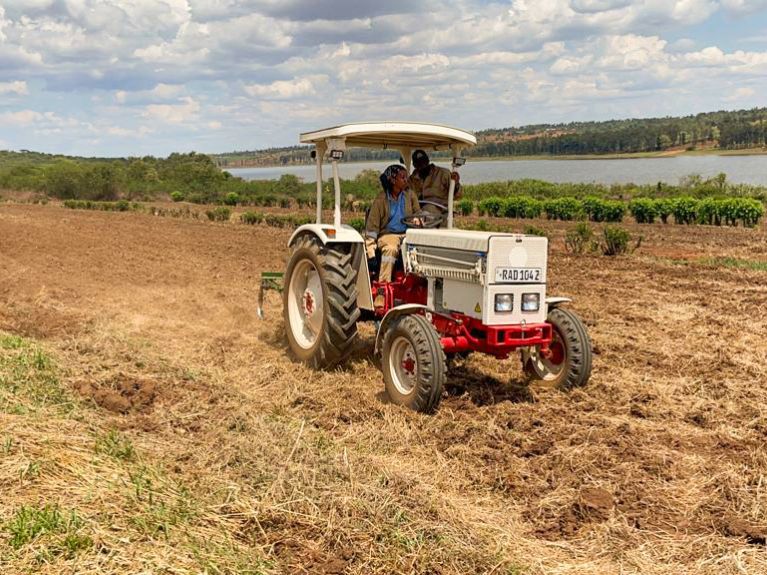E-mobility for Africa
Ideas for the energy transformation are being tested in countries like Rwanda and Uganda. Here are two German-African projects which protect the environment and make everyday life easier.

An e-tractor for Rwanda
So far, only one prototype is in operation, but before long five e-tractors are to help farmers in Rwanda with their work. The tractors are part of the GenFarm project, through which the German car manufacturer Volkswagen (VW) aims to create a socially and environmentally sustainable business model for Sub-Saharan Africa. The idea for a solar-powered tractor came from VW Group Innovation, which developed new projects for VW Group brands. VW South Africa and VW Rwanda are also involved. VW, which is based in Wolfsburg in North Germany, has subsidiaries in these countries. The project is a cooperation between the private and public sectors. On behalf of the Federal Ministry for Economic Cooperation and Development, it is supported by the Deutsche Gesellschaft für Internationale Zusammenarbeit (GIZ). This provided the National University of Rwanda with the financial resources to accompany it scientifically.

Making agriculture more productive
“Great poverty prevails in the rural areas of Rwanda,” says Andrea Denzinger, the project manager at the GIZ. “So that makes food security an important issue.” She explains the focus is on finding ways to improve productivity in agriculture but without harming the climate. Harvests are often inadequate to provide good quantities of food while the population in Africa is growing.
For the first phase, VW converted a diesel tractor to an e-tractor in Germany and sent it to Rwanda. Students and lecturers from the Rwanda Institute for Conservation Agriculture continue to test it on the institute’s grounds. They are investigating how much energy it uses for different kinds of work. For example, the e-tractor can be used to prepare ground, water crops or to transport other machinery. Denzinger says how long the battery lasts depends on the task for which the tractor is being used. However, an empty battery does not mean you have to wait for long: the tractor carries a spare. Alongside the tests, researchers interviewed farmers about their requirements. The studies show that there is great interest in these modern tractors.
Tractor sharing for farmers
Up next is the second phase of the project: testing in practice. VW is producing five e-tractors for this phase, which are to be sent to Gashora. The plan is for farmers to share the tractors. The project also aims to set up an “empowerment hub” with solar power and a battery. The intention is for the hub not just to be a space for e-tractors, but e-mopeds and other industries as well. Rwanda is taking the first steps in this, but in future there could also be e-tractors in other African countries.

Fetching water by e-bike
How do you build a robust e-bike which lasts for a long time and can be repaired with replacement parts from local markets? EURIST, the European Institute for Sustainable Transport, has set itself this goal for Africa. EURIST is based in Hamburg and Kampala and was founded by Jürgen Perschon. It is working with First African Bicycle Information Organisation Uganda (FABIO) and EBIKES4AFRICA to help promote sustainable mobility on the continent through what it calls its AfricroozE bike. The project received funding from KfW and donations to produce its first 100 bikes, which started testing in Uganda in 2017. Today, there are almost 180 AfricroozEs in Africa which are being used in a range of ways. Most are in services in Jinja in south-eastern Uganda.
Patient transport by e-bike
“Our bike is aimed at solving mobility problems says Christof Hertel, a member or EURIST’s executive board. The users were chosen by FABIO, with priority given to people who did not previously own a bike, for example. Amongst other things, the AfricroozEs are being used as patient transports. They can also be adapted to transport water or other cargos. They are even being used as taxis and delivery bikes. The project is financed from donations and government funding. The German actor Bjarne Mädel is an ambassador for the AfricroozE project.
Dieses YouTube-Video kann in einem neuen Tab abgespielt werden
YouTube öffnenThird party content
We use YouTube to embed content that may collect data about your activity. Please review the details and accept the service to see this content.
Open consent formThe individual parts of the bikes are manufactured by Hero Cycles in India before being assembled by FABIO. “Uganda is our focus,” says Hertel, but he stresses that there are plans to expand the project to other countries. They also plan to create more e-bike service centres where users can charge their bikes with solar power or electricity from a local water turbine. The centres are also planned to function as bike sharing stations.
Joy Kawanguzi, Managing Director of FABIO, says that women like using the bikes. One benefit is that they are zero-emissions. However, Kawanguzi adds that, “A clear legal framework needs to be created which includes reducing the high taxes which are levied on bikes and make them very expensive for locals.” She also draws attention to the shortage of replacement parts in Africa. In order to take the project further, EURIST has set up AfricroozE GmbH.


